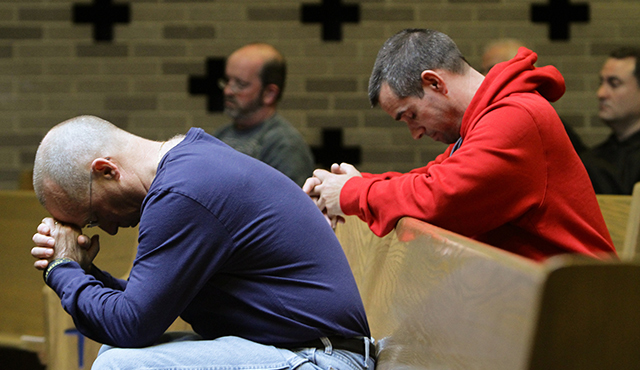The 2017 Lenten season begins on Ash Wednesday, March 1, 2017 and ends with the beginning of the Easter Triddum and the celebration of the Mass of the Lord’s Supper on Holy Thursday, April 13. Lent offers us the opportunity to prepare for the celebration of Easter, to walk with the catechumens preparing for the celebration of Baptism, Eucharist and Confirmation and for those of us who are baptized to prepare ourselves to renew our baptismal promises through penitential practices. In a particular way during Lent, we are asked to devote ourselves to the spiritual and corporal works of mercy that “remind us that faith finds expression in concrete everyday actions meant to help our neighbors in body and spirit.”
The following practices are to be observed by Catholics in the Diocese of Orange in their penitential practices:
1. It is to be noted first of all that it is by Divine Law that the faithful are bound to do penance and, as a specification of this obligation by the Church, some form of mortification by those 14 years of age and older is to be observed on all Fridays throughout the year. This obligation is in itself a serious one.
2. Everyone 14 years of age and older is bound to abstain from meat on Ash Wednesday and on all Fridays of Lent. No Catholic will lightly hold himself excused from this penitential practice. If for some serious reason a person must eat meat on a Friday in Lent, some other form of self-sacrifice should be performed.
3.Everyone who is at least 18 years of age and not yet 60 is bound also to fast on Ash Wednesday and Good Friday.
On these two days of fast only one full meal is allowed. Two other meals, sufficient to maintain strength, may be taken, but together they should not equal another full meal. Eating between meals on these days is not permitted, but liquids are allowed.
Where health or ability to work would be seriously affected, the law does not oblige.
Lenten Observance
4. In order that our love for Christ and identification with Him may be deepened, all Catholics during the period of Lent are encouraged to participate at daily Mass and to receive Holy Communion often; to participate in the devotional life of the Church; to give generously to religious and charitable works; to assist the sick, the aged and the poor; to practice voluntary fast, penance and self-denial, especially regarding alcoholic drink and social entertainment; and to pray more fervently, particularly for the intentions of the Holy Father.
5. Lent is an admirable time to preach the Gospel message of reconciliation and for Pastors to make available frequent communal celebration of the Sacrament of Reconciliation. In this way the social and ecclesial aspects of sin and reconciliation may be underscored. It should be noted, however, that at such communal celebrations, general absolution may not be given.
6. Ash Wednesday falls this year on March 1. Easter Sunday is on April 16th and the Easter Season concludes on the Feast of Pentecost, June 4th. Catholics are bound to receive Holy Communion at least once a year, especially within the Easter Season, unless for good reason the precept is fulfilled at some other time.
7. Marriages may take place during Mass and the Nuptial Blessing may be given, but it is contrary to the penitential spirit of the Season of Lent to have elaborate weddings and celebrations.
8. To afford the faithful opportunities for gaining the graces of the Lenten Season, there should be special Lenten Masses, particularly in the late afternoon or evening. The Way of the Cross and other prayer services should also be publicly celebrated during the Lenten Season.
9. There is to be no morning Mass celebrated on Holy Thursday. Morning Prayer is recommended.
10. Good Friday has become a day specially consecrated to prayer and meditation on the passion and death of Christ. Where the devotion of Three Hours is observed, however, it should not conflict with the primary importance of the liturgy of Good Friday. Morning Prayer is recommended.
11. In compliance with (1) the liturgical norms of the Roman Missal on “Easter Vigil” #3, (2) the Circular Letter Concerning the Preparation and Celebration of the Easter Feasts #78 and (3) published Diocesan regulations, the Easter Vigil Service must begin after nightfall (not before 7:50 PM). Morning Prayer is recommended.
12. Those responsible for the religious formation of the young should bring their children, whenever it is possible, to Church in Lent for the devotion of the Way of the Cross. It is commendable to have a separate devotion to the Way of the Cross accommodated to children, insofar as circumstances permit.
13. The Sacred Triduum begins with the Celebration of the Eucharist of the Lord’s Supper on Holy Thursday evening and ends with Easter Evening Prayer.

